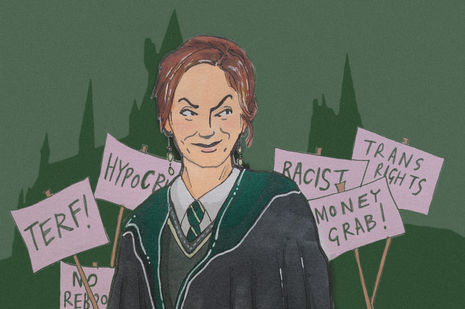HBO’S Harry Potter will unfortunately succeed – but what will this mean a decade from now?
Josh Pritchard reflects on the beginnings of HBO’s Harry Potter reboot

In May, HBO revealed the young trio set to lead its upcoming Harry Potter television adaptation. Since then, one can’t help but wonder how Dominic McLaughlin, Alastair Stout, and Arabella Stanton have been handling their newfound fame. The three come from varied professional backgrounds: Stanton, who is set to take on the role of Hermione, starred as Matilda in the 2023 West End production of Matilda the Musical, while Stout, cast as Ron, only has a fleeting appearance in a potato commercial to his name. This contrast isn’t meant to undermine the casting – if anything, it aligns charmingly with their character’s dispositions – but rather, to express concern. How do you prepare a young actor for this kind of production? How can you prepare them for the public firestorm that will surely accompany this series’ initial release, and could potentially linger for the rest of their lives?
“There is good reason to believe the show itself will be extremely well-made”
I was one of the many children who adored Harry Potter. When I was young, my mum would rent out the Stephen Fry audiobooks from our local library, and I’d sit for hours by our old CD player, wrapped in earnest at the story of a young boy thrust into a world of magic, wonder, and delight, protected against the evil which permeated through it by the power of love. How ironic that this latter sentiment is utterly removed from any mention of the franchise nowadays. The anti-trans obstinance of franchise creator J. K. Rowling, alongside the critical and commercial failure of the spin-off series Fantastic Beasts, which featured a conveniently removable gay kiss between Dumbledore and Grindelwald, has been enough to poison any mention of the series within the cultural zeitgeist.
This sentiment is bound to collide with the show – both online and in person – regardless of its actual quality, at least initially. There is good reason to believe the show itself will be extremely well-made. Showrunner Francesca Gardiner was behind HBO’s His Dark Materials and recently won 2 Emmys whilst producing Succession. Mark Mylod, the show’s main director, boasts credits on Game of Thrones, The Entourage, and The Menu. The cast also hold considerable range in both drama and comedy, with John Lithgow as Dumbledore, Katherine Parkinson as Molly Weasley, and Nick Frost as Hagrid. Still, the question remains: who is this show aimed towards, and what does it seek to do with its source material? This will be a “decade-long series,” according to HBO, so whether any sentiment will endure against that scale remains to be seen.
If anything, the show’s opposition is already becoming diminutive. A 2024 YouGov survey found that whilst Rowling herself was largely unpopular amongst young Brits, her books and films remained popular, with four out of ten answering that they would likely watch the upcoming series. Similarly, the franchise’s first major endeavour into AAA video games, Hogwarts Legacy, was an astounding success, generating over $1 billion within a few months of its global release, and reaching 34 million sales by the end of March 2023. Despite wavering calls for boycotts, the impact of these appeared to be minimal – the general public did not seem to view the opinions of J. K. Rowling as a reason to boycott the franchise.
“Maybe their silence will start to become the norm”
Maybe then, the show’s publicity team will take note, and just pretend none of the franchise’s controversy exists. Tom Felton, sporting his best I-really-want-to-go-home face, claimed he was “not really attuned” to the controversy surrounding Rowling, only to later go viral for his return to Draco Malfoy on Broadway, fighting back tears as he slipped back into the luscious blonde locks of his childhood, and likely cashing in a sweet pay day following a hard day’s corporate obsequity.
Felton’s courage will surely be a shining example for other actors. Paapa Essiedu is set to become the cause of a health crisis among the publicity department the next time he sits down in a chair, having signed an open letter opposing the UK Supreme Court’s ruling on the Equality Act and being set to play a black Snape at the mercy of a presumably white James Potter. It’s not as though the show won’t be able to tackle the nuances of this – I recommend reading Jason Okundaye’s brilliant article in The Guardian – but the press room won’t exactly be Christmas morning come the show’s premiere. But then again, why worry? Every worker on the show signed on the dotted line. Maybe their silence will start to become the norm.
In a decade from now, how will we feel about Harry Potter? Will there be another wave, akin to the 2010s, where children rush to buy new wands, dive into freshly minted lore, and flood cinemas, restoring the franchise to one of the top five highest-grossing of all time?
We live in a time where entertainment is used to mask real-world injustice. As Rowling continues to spread and financially support anti-trans rhetoric, will we, by 2035, still have the courage to talk about it openly? To raise it with our kids? With our peers? Or will consumerism swallow the conversation entirely, nudging us to simply ‘watch along’ with everyone else? Who’s to say? Television never stops. We, eventually, will.
 News / Cambridge academics sign open letter criticising research funding changes22 February 2026
News / Cambridge academics sign open letter criticising research funding changes22 February 2026 News / University Council rescinds University Centre membership20 February 2026
News / University Council rescinds University Centre membership20 February 2026 News / Supporters protest potential vet school closure22 February 2026
News / Supporters protest potential vet school closure22 February 2026 News / Hundreds of Cambridge academics demand vote on fate of vet course20 February 2026
News / Hundreds of Cambridge academics demand vote on fate of vet course20 February 2026 Comment / A tongue-in-cheek petition for gowned exams at Cambridge 21 February 2026
Comment / A tongue-in-cheek petition for gowned exams at Cambridge 21 February 2026








